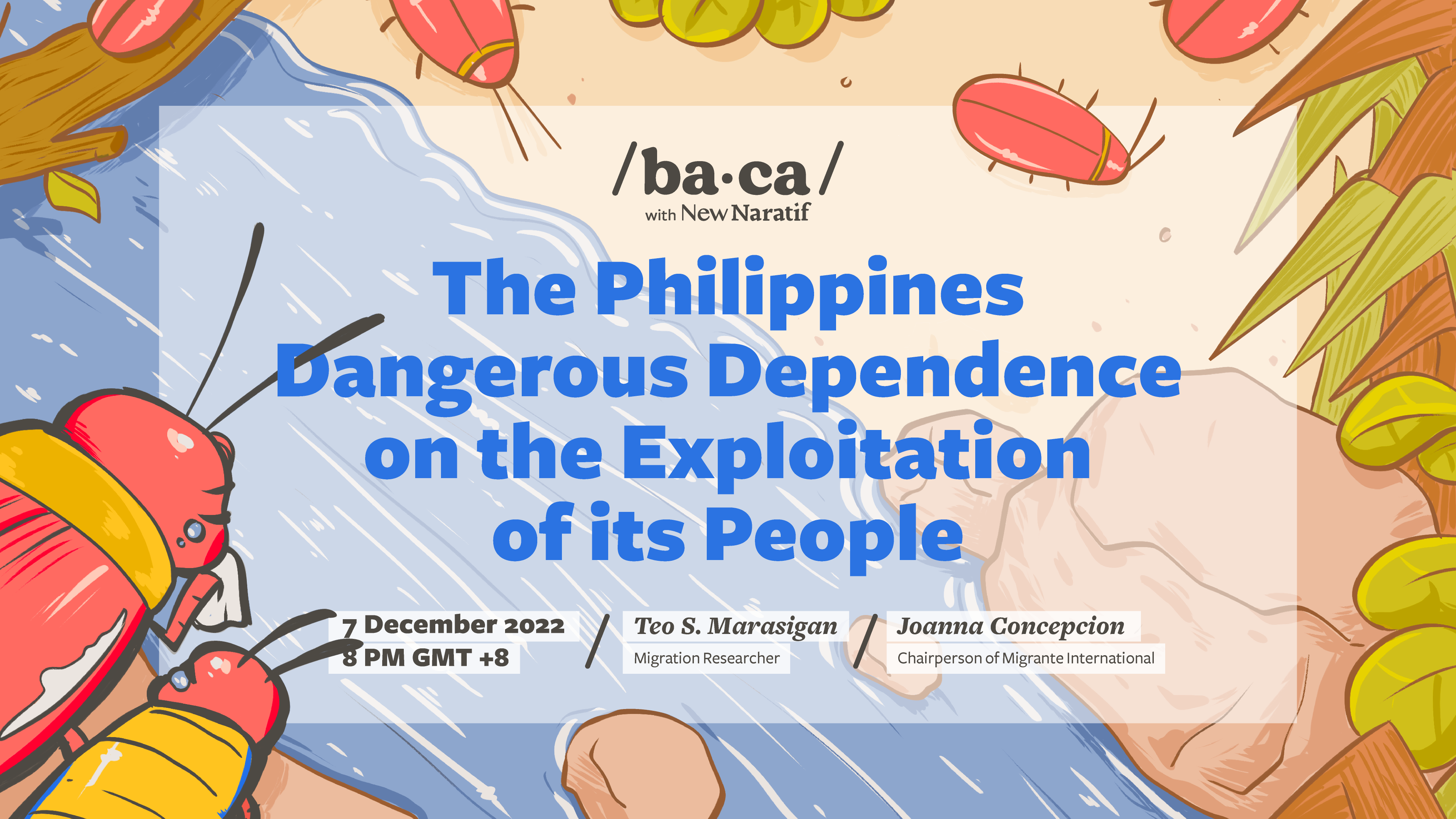/ba∙ca/ with New Naratif is a reading group series that invites members to come together to discuss selected stories published by New Naratif.
While the “export” of Filipino workers provides immediate benefits to families of migrant workers, in the long term it also causes serious problems for the workers, their families, and national development. But labour export continues to be actively promoted by the Philippine state because it provides short-term benefits to the Philippine economy, and more importantly, it boosts the profits of foreign and local elite interests.
In this session of /ba.ca/ with New Naratif, we will discuss the structural issues that drive these exports (meanwhile, the individual/personal factors that drive migration will be addressed in a future event). We’ll get to hear from Teo S. Marasigan, author of the article, The Philippines’ Dangerous Dependence on the Exploitation of Its People, on the questions: Who are the Overseas Filipino Workers (OFWs)? Why does the Philippines aggressively export labour, and what are the effects on the Philippines’ economy, society, and politics? Who benefits and who loses out?
We look forward to discussing The Philippines’ Dangerous Dependence on the Exploitation of Its People with you!
Guest speakers:
Teo S. Marasigan is a Filipino activist and researcher. He is the author of Na Kung Saan (In Which), a collection of essays, published by the University of the Philippines Press in 2018.
Joanna Concepcion is a graduate of BA Feminist Studies from the University of California, Sta. Cruz. She served as executive director of the Filipino Migrants Center in the US, before deciding to go home to continue her advocacy for migrant Filipinos. She is now chairperson of Migrante-International, the biggest alliance of migrant Filipinos worldwide.
Main reading:
- The Philippines’ Dangerous Dependence on the Exploitation of Its People by Teo S. Marasigan
Supplementary readings:
Robyn Rodriguez, Migrants for export: How the Philippine state brokers labor to the world. Minneapolis and London: Minneapolis University Press, 2010.
- An empirically-grounded theorizing of the Philippine state as a labour brokerage state. Shows how systematically the government pursues its Labour Export Policy.
Leah E. Masselink and Shoou-Yih Daniel Lee, Nurses, Inc.: Expansion and commercialization of nursing education in the Philippines, Social Science & Medicine, 71 (2010), 2010, 166-172.
- Discusses the culture of migration among nurses, one of the most common OFW occupations in Global North countries.
Jean Encinas-Franco, The language of labor export in political discourse: “modern-day heroism” and constructions of overseas Filipino workers (OFWs), Philippine Political Science Journal 34(1), 2013, 97-112.
- An examination of the Philippine state’s discourse on labour migration, which projects OFWs as modern-day heroes.
Raul Pertierra, Lured abroad: The case of Ilocano overseas workers. Sojourn, 9(1), 1994, 54-80.
- Old but gold, as they say, this article offers important insights from the Ilocos region in the Philippines, which many pioneers of labour export hail from.
Rene Ofreneo, Growth and employment in de-industrializing Philippines. Journal of the Asia Pacific Economy 20(1), 2014, 111-129.
- Provides an important political-economic background to the OFW phenomenon, and to the present-day Philippine economy as well.
Asia Pacific Mission for Migrants, Global Migration Report 2015. APMM, November 2015.
- Presents the Philippines alongside other case studies on migrant-sending and migrant-receiving countries, as well as a progressive take on the migration and development debates.
——
This event is free for all members. Non-members can purchase a US$5 ticket that includes a month of New Naratif membership.
Artwork by Townsunder.
Artist’s Statement
The concept for the imagery came from a dear educator I met from UP College of Fine Arts who said that Filipinos are the cockroaches of the world due to our ability to adapt to other lands and external pressure. He said this with utmost respect and love for our countrymen. And given the weight of this article, it is the best time to shed light on possible issues that could come from our go-getter attitude (see: martyrdom) to prove ourselves worthy of opportunities we have, despite these being exploitative and inhumane.



